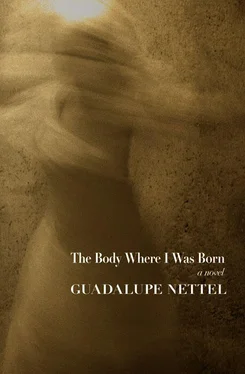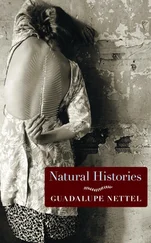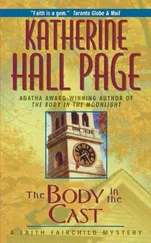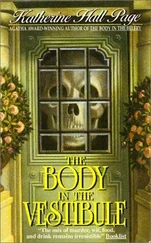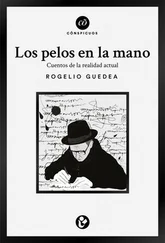In a dream one Friday night, I discovered that for the entire time my brother and I had been living with my grandmother, Dad had been living in our country house with a different family. I woke up certain I would find him there and decided to confirm it. What would I have done, Dr. Sazlavski, if, after all that had happened lately, I were to actually see him? Would I have demanded he explain, or reproached him for leaving us to our fate? That morning I got up very early and left the house unseen. I brought with me a change of clothes and a thousand pesos in bills of fifty that I’d taken from my grandmother’s cash box. It was the first time in my life that I’d gone through the gates of Villa Olímpia by myself, which ended up being easier than I’d expected. I got a taxi near the entrance and asked the driver to take me to the Taxqueña bus station. Luckily, the taxi driver didn’t ask me to tell him the route, like they all usually do, because I didn’t have the faintest idea of how to get there. As soon as I stepped inside the station, I walked up to the first window I saw and asked for a ticket to Amatlán, Morelos. Not once did the clerk at the counter ask about my parents. It surprised me that I was walking so freely around the streets and the halls of the station, enormous in my eyes, and no one seemed shocked to see a little girl alone. My entire life, I had heard stories about how children and preteens are kidnapped in our city if they get separated from their families by five inches. As I climbed onto the bus, I had time to realize that I wasn’t the only one. Other young kids like me were moving around on their own, unaccompanied. Some were just passengers, others were at work selling gum or carrying luggage. I sat in one of the first seats, and when we arrived I set off wandering toward the center of town for a few minutes, until I recognized a street that would take me straight to the house. I had to walk a half an hour before reaching the wooden outer door. Despite how nervous the idea of finding my father was making me, I also felt exalted by the adventure and proud of myself. I was ready to face whatever. Neither possible outcome, the absence nor presence of my father in this place, would defeat me. It was with this conviction that I rang the bell. I was going to scale the fence if nobody opened the door. The six feet of stones posed no challenge to my feet, so used to climbing trees and scaling all kinds of crevices. I also needed to know what had happened to the house we hadn’t been to in these long months. Was somebody still paying the gardener? I had considered almost every possible outcome, except for the one I found when the door finally opened and a woman dressed as a nurse greeted me. It took me a few minutes to be able to speak.
“Did something happen to my father?”
The nurse smiled kindly but didn’t answer my question. Instead, she asked what my name was and invited me inside. It felt like a mistake, a time lapse, or something like that. This woman’s white uniform, her stockings, and her chunky shoes were all a bad omen. So was her evasiveness.
“Not that I know of,” she answered. “He hasn’t come here for some time. But you’d better come with me to see his sister, Señora Anita. She talks to him once in a while. Let’s go to the office.”
My Aunt Anita was my father’s older sister. I hadn’t seen her in over three years. What was she doing here?
I didn’t have a damn clue what was going on, but decided not to demand an explanation and to follow her. The nurse led me to the main room in the house, upstairs, which I had always known as the master bedroom. What I saw on the way increased my bewilderment: everywhere, from the garden to the terrace and around the pool, there were old people. Other nurses were pushing them around in wheelchairs. There was no sign of our dog. They must have tied her up so she wouldn’t attack the old folks. I didn’t ask, I just continued up the stairs. When I got there, I saw the bedroom was completely transformed into an office: bookshelves, filing cabinets, and tables with documents had replaced the bed and dresser. My aunt was on the other side of the desk. When she saw me, she stood up from her chair and ran over to hug me.
“Love,” she said, “what are you doing here?” Her face showed worry and pity. I could have asked her the same question. But I decided to ask something more urgent:
“Where is my dad?”
My aunt hugged me again and told me the same thing as everyone else.
“He’s still in the United States. We don’t know when he’ll be back. But you know who is here? Your grandmother. Do you want to see her?” My heart dropped into my stomach. Was it possible that she had followed me to the bus station? It took me a few seconds to understand that she was talking about my paternal grandmother, the one I hadn’t seen in over a year.
“It was your father’s idea to turn the house into a nursing home. This way we can take care of your grandmother and earn a bit of money at the same time.”
My aunt’s explanation seemed to make sense, but seeing it in effect didn’t. At least for me, it was maddening to see so many old people in bathrobes and pajamas in the hallways and bedrooms. Throughout the entire building you could smell the shameless odor of urine barely masked by the subtle smell of disinfectant. The current state of our house was proof that everything had been irrevocably turned upside down. On the wall in the living room there was a sign: “Learn to die and you will have learned to live.” The phrase would remain stuck in my memory. While we were walking, I took advantage of the silence to ask about Betty, our dog. I was told that she had gone home with the gardener, Guillermo, with the promise that he would return her when asked. I was happy for the dog; the caretaker was a good person and fond of her. She was certainly better off with him and his family than in this home where everyone was waiting around to die.
Anita took me to a patio out back, a spot we had never thought about when the house was ours. That’s where my paternal grandmother was, sitting with a vacant expression in a wheelchair. Many months ago, I had heard Dad say that his mother suffered from a mental illness that made her regress to different previous stages in her life, and that there was nothing she nor anyone could do to stop it, but this was the first time that I had seen someone with Alzheimer’s.
“Her condition has gotten much worse,” my aunt commented, her voice serious. “She can’t really talk. But, you know what? I’m sure she’s happy to see you.”
My grandmother’s expression didn’t show an ounce of joy. Instead she looked stern, with that downturned mouth her decendents, all of us, have inherited — an accentuated inverted smile. I have it, and so does my brother, my father, and the same Aunt Anita. Years later, my son would show it off from his incubator. My grandmother had become the most defenseless being in the world, unable to decide for herself where and how she wanted to live, like a child, and yet, at the same time, she had an enviable means of escaping to better days. I gave her a little hug like my aunt had given me in the office, and when I did, I recognized the scent of her skin. I remained with her in silence while Anita went off a few feet to explain I don’t know what to the nurses. When she came back, I stood behind the wheelchair and kissed the graying hair of my grandmother. It was the last time I was with her.
My aunt asked me if I wanted to spend the night there. She also offered to take me to Cuernavaca, where she lived, to spend the rest of the weekend with her family. But I preferred to return to Mexico City. I didn’t want what I had done to come to light back home. My grandmother would get alarmed and, much worse, double her vigilance, restricting this very promising freedom that I had just found. I returned to the apartment that evening like any other Saturday. When my brother asked why I never came to the soccer field that day, I told him that I had not felt like seeing anyone. That was all I said. Once in bed, I went through the images of the day. For the first time in nine months, I was glad to be home.
Читать дальше
